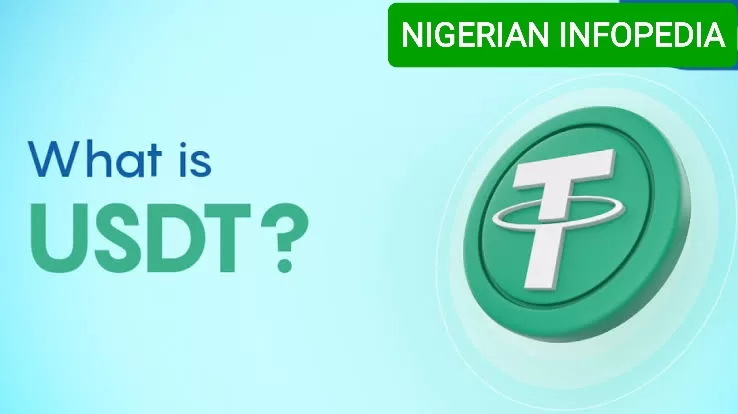Is USDT Legal in Nigeria?
You might want to know if USDT is legal in Nigeria? USDT is one cryptocurrency that have gained popularity worldwide. Tether, as it is alternatively known, is a stablecoin pegged to the US dollar. It has become one of the most widely used cryptocurrencies. However, the legal status of USDT and other cryptocurrencies in various countries remains a subject of scrutiny and debate. In this article, we will explore the legality of USDT in Nigeria.

ABOUT USDT: WHAT IS IT ABOUT?
USDT (also known as Tether) is a type of cryptocurrency referred to as a stablecoin. It was launched in 2014 by Tether Limited, a Hong Kong-based company. USDT is designed to maintain a stable value by being pegged to a reserve of assets, with each USDT token representing one US dollar.
The purpose of USDT is to provide users with a digital currency that maintains a stable value equivalent to that of the US dollar. This stability is achieved through the backing of each USDT token with actual US dollars held in reserve by Tether Limited. The company claims that the reserves are audited on a regular basis to ensure transparency and the one-to-one peg to the US dollar.
USDT operates on various blockchain platforms, including Ethereum, Tron, and Solana, using the respective protocols to facilitate transactions. It enables users to have a digital representation of the US dollar that can be used for transactions, trading, and storing value within the cryptocurrency ecosystem
The Central Bank Position on USDT Cryptocurrency The Central Bank of Nigeria (CBN) has not issued any specific statements or directives regarding the legal status of USDT (Tether) cryptocurrency in Nigeria. However, it is important to understand the broader stance of the CBN towards cryptocurrencies, as it applies to USDT as well.
The CBN has expressed concerns about the risks associated with cryptocurrencies, including money laundering, terrorism financing, consumer protection, and the potential for disruption to the traditional financial system. In a circular issued in March 2017, the CBN stated that cryptocurrencies were not recognized as legal tender in Nigeria, cautioning financial institutions and the public about the risks involved in their use.
Furthermore, in March 2021, the CBN issued a directive instructing financial institutions to close accounts associated with cryptocurrency transactions. This directive generated controversy and led to debates about the impact on individuals and businesses involved in cryptocurrencies, including USDT.
SECURITIES AND EXCHANGE COMMISSION (SEC) GUIDELINES ON USDT USE IN NIGERIA
The SEC in Nigeria has released guidelines for the regulation of cryptocurrencies and digital assets. While these guidelines primarily focus on securities offerings and the regulation of crypto assets as securities, they provide some regulatory oversight for cryptocurrency activities. However, it is important to note that these guidelines do not specifically address USDT or stablecoins.
AML/KYC REGULATIONS ON USDT IN NIGERIA
The use of USDT or any cryptocurrency in Nigeria may have implications for anti-money laundering (AML) and know-your-customer (KYC) regulations. Exchanges and platforms facilitating USDT transactions are expected to comply with AML and KYC requirements to prevent illicit activities and ensure customer protection.
CRYPTOCURRENCY EXCHANGES AND USDT TRADING
Despite regulatory uncertainties, cryptocurrency exchanges operating in Nigeria have facilitated the trading of USDT and other cryptocurrencies. Some exchanges provide fiat-to-USDT trading pairs, allowing users to convert Nigerian Naira into USDT and vice versa. The regulatory oversight of these exchanges remains a critical factor in determining the legality of USDT transactions.
FREQUENTLY ASKED QUESTIONS ON THE LEGALITY OF USDT IN NIGERIA
Here are some recurring questions about how legal is the USDT use in the country.
IS USDT LEGAL IN NIGERIA?
The legal status of USDT in Nigeria is not explicitly defined. While the Central Bank of Nigeria (CBN) has expressed concerns about cryptocurrencies, including USDT, it has not specifically addressed its legality. However, the CBN has issued directives and circulars that impact the use and trading of cryptocurrencies in the country.
WHAT IS THE REGULATORY FRAMEWORK FOR CRYPTOCURRENCIES IN NIGERIA?
The regulatory framework for cryptocurrencies in Nigeria is still evolving. The CBN has taken a cautious approach, highlighting risks such as money laundering and consumer protection. In 2017, the CBN classified cryptocurrencies as not recognized as legal tender in Nigeria.
CAN USDT BE TRADED IN NIGERIA?
A4: Yes, USDT can be traded in Nigeria. Several cryptocurrency exchanges operating in the country facilitate the trading of USDT and other cryptocurrencies. These exchanges often offer fiat-to-USDT trading pairs, allowing users to convert Nigerian Naira into USDT and vice versa.
WHAT PRECAUTIONS SHOULD I TAKE WHEN USING USDT IN NIGERIA?
When using USDT or any cryptocurrency in Nigeria, it is advisable to exercise caution and conduct thorough research. Be aware of the regulatory landscape and potential risks associated with cryptocurrencies.
IS IT SAFE TO INVEST IN USDT IN NIGERIA?
Investing in USDT, like any other investment, carries risks. The cryptocurrency market can be volatile, and the legal uncertainties surrounding USDT in Nigeria add an additional layer of risk. It is essential to assess your risk tolerance, conduct thorough research, and seek professional advice before making any investment decisions.
CAN I USE USDT FOR EVERYDAY TRANSACTIONS IN NIGERIA?
While USDT can be used for transactions, its acceptance as a medium of exchange for everyday transactions in Nigeria is not widespread. The majority of people and businesses in Nigeria still primarily rely on traditional fiat currencies like the Nigerian Naira.
CONCLUSION
From what we have explained so far, we can say that the legality of USDT in Nigeria is not clearly mentioned. The legality of crypto trading in Nigeria remains a topic of significant debate and ambiguity. While the Central Bank of Nigeria (CBN) has expressed concerns regarding the risks associated with cryptocurrencies, including money laundering and consumer protection, there is no explicit ban on crypto trading. The Nigerian government is in the process of formulating regulations to address the use and trading of cryptocurrencies, recognizing the potential benefits and risks they present.